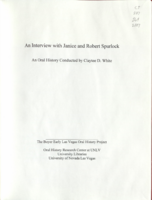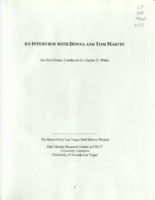Search the Special Collections and Archives Portal
Search Results

Transcript of interview with Rabbi Sanford Akselrad by Barbara Tabach, October 29, 2014
Date
Archival Collection
Description
Sanford Akselrad is the rabbi at Congregation Ner Tamid. In this interview he describes his rabbinical training, coming to Las Vegas, and the growth of the congregation.
More inclined in his youth to pursue a career as a scientist than rabbi, Sanford Akselrad (1957- ) became the rabbi at Congregation Ner Tamid in 1988. Turning his tenure, Rabbi Akselrad has lead the congregation through its move from Emerson to Street to its permanent home on Green Valley Parkway and I-215 and shares a fun story about buying desks and chairs from the Clark County School District. He talks about many of the milestones including: Project Ezra which he started during the 2008 recession to help Jewish community members find jobs; the NextGen program which was initiated to bring young adults in their twenties and thirties back to the temple. For over twenty years Rabbi Akselrad was a member of the board of the Nevada Governor?s Council on Holocaust education, a topic that was the focus of his rabbinical thesis. He was the founding president of the Clark County Board of Rabbis and has served on the boards of the Jewish Federation of Las Vegas, Jewish Family Services, and the Humana Hospital Pastoral Advisory Board. He was also the chair of the Federation?s Community Relations Council (CRC). Rabbi Akselrad is a board member of the Anti-Defamation League Nevada region office and the Interfaith Council of Southern Nevada. Sanford Akselrad was born on October 6, 1957 in Oakland, California and raised in Palo Alto. He attended the University of California, Los Angeles and then went to graduate school at the Hebrew Union College Jewish Institute of Religion. He spent the first year of his graduate program in Israel, the next two in Los Angeles, and the final two years in Cincinnati, Ohio. Rabbi Akselrad met his wife Joni in Reno, Nevada and married her during his third year of rabbinical school. The couple has two children, CJ and Sam. After his ordination in 1984, Rabbi Akselrad was associate rabbi of Temple Israel in Columbus, Ohio, one of the largest Reform congregations in the Midwest. His choice of career was inspired by his father, Sidney Akselrad, who was a prominent rabbi involved in social justice issues and the Civil Rights Movement. Sanford Akselrad has followed his father?s example of community involvement, both in Las Vegas and on a national level: he served on the board of the National Conference of Community and Justice (NCJJ), he was chair of the NCJJ's Inter-faith Council, and he is active in the Union of Reform Judaism (URJ).
Text

Transcript of interview with Kathleen Bryan Gaston by Niki Rodriguez, March 17, 1981
Date
Archival Collection
Description
On March 17, 1981, Niki Rodriguez interviewed Kathleen Bryan Gaston (born 1949 in Las Vegas, Nevada) about her experience living in Southern Nevada. Gaston first talks about her father who moved to Las Vegas and eventually became a justice of the peace, and she also describes how her parents eventually moved to Las Vegas. Gaston later describes how Las Vegas looked as she was growing up and how it has developed since, specifically mentioning the schools she attended and the growth of the Las Vegas Strip.
Text

Transcript of interview with John Grayson by Elizabeth Patrick, May 23, 1983
Date
Archival Collection
Description
On May 23, 1983, collector Elizabeth N. Patrick interviewed gaming professional John Grayson (born May 25, 1898 in Grayson, Missouri) at the University of Nevada, Las Vegas. The interview covers John Grayson’s experience with gaming in Arizona, California, and Nevada. Also present during John Grayson’s interview is Billy H. Gray, a longtime gaming associate of his, who helps Mr. Grayson go into greater detail about key events.
Text

Transcript of interview with Earl A. Evans by Lance Malone, March 15, 1981
Date
Archival Collection
Description
On March 15, 1981 Lance Malone interviewed Sears Roebuck Division Manager, Earl A. Evans, Jr., (born March 3rd, 1935 in Alhambra, California) in Las Vegas, Nevada. This interview covers the history of Nevada and Mr. Evans’s life. During the interview, Mr. Evans discusses education, sports, employment, the weather and the railroad in Las Vegas. He also discusses transportation, recreation, community involvement, raising a family in Las Vegas, the development of Fremont and the Strip, and religious activities. Mr. Evans served as a Bishop for the LDS Church in Las Vegas and in regards to education, he served on the Clark County School Board.
Text

Transcript of interview with Janice and Robert Spurlock by Claytee White, June 17, 2010
Date
Archival Collection
Description
Janice and Robert Spurlock were married in 1990 and each has a lifetime of Las Vegas memories. They have made Sandy Valley home for nearly 32 years. Together the couple recalls the people and places of Las Vegas' past from their points of view during this oral history interview. For Janice the stories begin in the 1930s after her family moved to Las Vegas from California. She was a youngster of about five. Among the topics she talks about is walking to Fifth Street Grammar School, graduating from Vegas High School, and fun had during Helldorado Days. In 1953, Robert arrived. He was a young man headed from Arizona to Colorado seeking work as a welder. He stopped in Henderson, Nevada and never quite made it out of the area. For the next two decades he worked construction and helped build many local landmarks. He shares stories about the range wars and about being accidentally exposed to radiation from the Nevada Test site.
Text

Transcript of interview with Jan Stewart by Claytee White, June 28, 2010
Date
Archival Collection
Description
In 1901, Jan Stewart's grandfather William T. Stewart brought his family to Alamo, Nevada in Lincoln County and about 90 miles north of Las Vegas to ranch. Soon he and his wife were operating a livery stable. One of his customers was an executive with the Union Pacific Railroad for whom he provided transportation to Las Vegas, where the railroad owned a ranch referred to as the Old Ranch. In this narrative Jan recounts how his grandfather and later his father became managers of the Old Ranch and lived a just a few dozen yards from the Old Mormon Fort, a historic Las Vegas landmark. In addition to sharing stories of his family's history, he describes how the ranch was a unique place to group up, brought the family in contact with many community people and an occasional celebrity.
Text

Transcript of interview with Tom and Donna Martin by Claytee White, January 31, 2013
Date
Archival Collection
Description
Hailing from Indiana and California, Donna Guiffre Martin and Tom Martin came to Las Vegas in the early 1950s as their parents sought new opportunities. Donna's father, Gus Guiffre, quickly established himself as a local television personality, while Tom's father took on a variety of entrepreneurial opportunities. Like many of the young people in Las Vegas, Donna and Tom enjoyed riding around town; horse-back riding; football games; Helldorado - and, of course, Rancho High School. This interview covers both Donna and Tom's early years before their moves to Las Vegas, as well as their memories of first homes, childhood experiences, early adulthood and their current lives.
Text

Relda W. Leavitt interview, March 18, 1976: transcript
Date
Archival Collection
Description
On March 18, 1976, collector David Steele Broussard interviewed Relda Whitney Leavitt (born April 3rd, 1917 in Saint Thomas, Nevada) at her home in Las Vegas, Nevada. In this interview, Mrs. Leavitt discusses growing up in Saint Thomas, Nevada before her family moved to Las Vegas. She also discusses moving to Las Vegas, Nevada and her family’s dairy business in Whitney, Nevada. She speaks about the different changes and growth she has seen in Las Vegas over the years.
Text

Interview with Wayne Albert Violette, January 12, 2005
Date
Archival Collection
Description
Text

Interview with Raymond Chester Harbert, April 3, 2006
Date
Archival Collection
Description
Text
